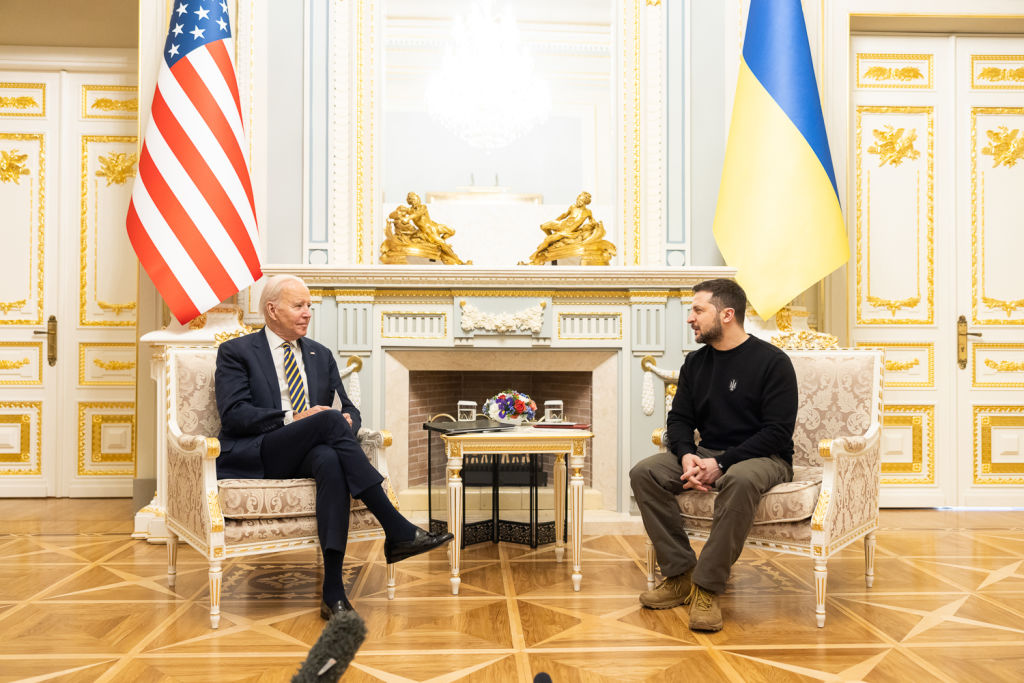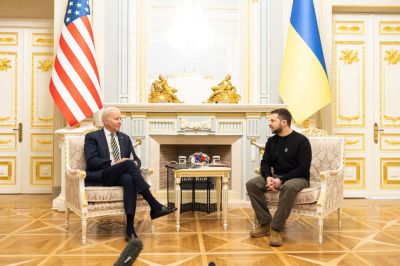Signs of waning American influence are omnipresent in the Middle East. The Saudis turn the oil spigot on and off without the careful coordination that was once a hallmark of Washington-Riyadh ties, and they are also slow-rolling diplomacy with Israel despite the urging of officials in Washington. The United Arab Emirates is partnering with Chinese tech giant Huawei for its 5G network, shrugging off U.S. warnings. Other regional countries are deepening business ties with Beijing, too. Jordan is pulling away from the U.S.-brokered alliance with Israel. Meanwhile, the Israelis and Palestinians continue to balk at peacemaking efforts, despite American exhortations to return to the table.
Traditional allies in the region have not abandoned us, but some may be eyeing the exits. We could wag our fingers at them, but that’s not going to solve the problem. They want American leadership, and we’re not delivering.
Instead, our allies are experiencing whiplash from our wild political swings. One White House supports maximum pressure on Iran, labeling it the greatest threat to the region. The next administration seeks maximum engagement, dangling sanctions relief that will only increase the Iranian threat. One administration is transactional in nature about human rights, and the next prioritizes them. Our allies are exasperated, and they say so in closed-door meetings.
To address this problem, America must find its way back to the relative centrism that once characterized our foreign policy. Democrats and Republicans have always disagreed on much, often bitterly. But Cold War foreign policy did not change drastically from one administration to the next. Nor did the promotion of core American values. As a result, we sustained stable alliances.
But projecting stability is only part of the equation. We must also project power like we did in the early 1990s.
When we appear indecisive about shooting down a Chinese balloon traversing American airspace, our Middle East allies worry we will dither in the face of threats in their neighborhood. In fact, some of our allies are openly pondering whether America is still a superpower. We lost recent wars to far lesser powers in Iraq and Afghanistan. And now China appears poised to leapfrog the United States, militarily, economically, and even technologically in some ways.
Of course, China is not the only challenge. In the wake of Vladimir Putin’s invasion of Ukraine one year ago, the structures that governed the globe for nearly a century are groaning under the weight of war on the edge of Europe. In so doing, Russia has directly threatened the U.S.-led world order.
Confrontation with China may not be a foregone conclusion. But a shadow war with Russia is already underway. Meanwhile, the Iranians are plying Moscow with weapons while destabilizing our allies across the region. Both challengers must be defeated.
Some politicos in Washington say America has no business backing Ukraine because it is not in the EU or NATO. Some of those same voices assert that America should appease Iran rather than check the regime’s aggression. They’re not seeing the big picture. Should Ukraine fall, it will be viewed as a defeat for America, regardless of whether the United States puts boots on the ground. Similarly, if Iran widens its influence in the Middle East, the U.S.-led world order could become increasingly difficult to sustain.
By contrast, should the Ukrainians defeat Putin’s army, and should the regime in Tehran retreat, the U.S. will project power it can leverage.
There is a clear historical analogy here. Consider what happened when the United States ousted Saddam Hussein’s Iraqi army from Kuwait, which was followed by the dissolution of the Soviet Union in 1991. These victories reverberated in two distinct ways.
First, harnessing its bolstered superpower status, the U.S. wielded the Madrid Peace Conference of October 1991 to drive the Oslo Process, a decade-long diplomatic effort to achieve a two-state solution between Israel and the Palestinians. That ultimately collapsed in 2001, but America came close. One key reason was that the vast majority of the Middle East backed the process out of respect for American power.
To that point: While the starting point for Pax Americana is often identified as the end of World War II, America’s influence surged after 1991. The alliance structures forged in the wake of these victories in Iraq and the Cold War, particularly in the Middle East, have endured. Only recently, as America’s resolve has weakened, have those alliances grown wobbly.
If the goal is to sustain the U.S.-led world order, America must defeat those that would dare challenge it. Of course, the bitter partisan battles in America often call into question whether that is the goal. It should be, though. There is no substitute for American power—at least no good one.
Remarkably, even with all the dysfunction, American victories are within reach. Russia is struggling on the battlefields of Ukraine. Iran is increasingly susceptible to pressure from inside the country and out.
History, as it is said, does not repeat. But it often rhymes. Defeating Russia and a Middle East aggressor are once again possibilties. Defeating them could help America’s superpower status rise again.






Please note that we at The Dispatch hold ourselves, our work, and our commenters to a higher standard than other places on the internet. We welcome comments that foster genuine debate or discussion—including comments critical of us or our work—but responses that include ad hominem attacks on fellow Dispatch members or are intended to stoke fear and anger may be moderated.
With your membership, you only have the ability to comment on The Morning Dispatch articles. Consider upgrading to join the conversation everywhere.